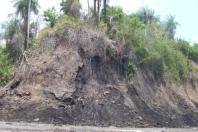Tar Sands and Oil Shale go Global
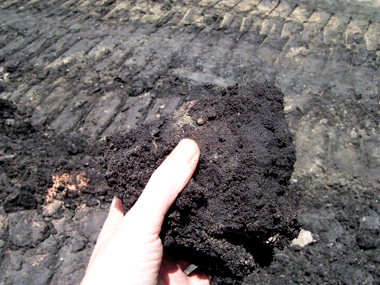
Tar sands bitumen freshly dug from the earth, Trinidad and Tobago
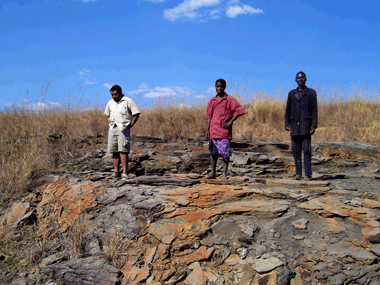
Locals stand on tar sands outcrop, near village of Ambonara, Bemolanga, Madagascar. Photos: M. Stainsby
Tar Sands
The Tar Sands Gigaproject of Canada is decimating rivers, huge swaths of land, human and animal health across vast territories. The gigaproject is promoting the devastation of otherwise pristine, mostly untouched lands across all of North America. It is judged by many to be the largest and most destructive project in human history. What is most pressing on a global scale is the impact tar sands have on a global energy mix at a time of escalating climate change. To understand Canadian tar sands in more depth, please visit oilsandstruth.org for detailed information.
The tar sands, however, are not just in Canada anymore. The threat to the climate tar sands development poses is now one of Canada's primary exports. Government and industry alike are sending tar sands technology to vulnerable, often impoverished regions of the planet, while exporting tar sands bitumen to its wealthy neighbour to the south.
World-famous climate scientist James Hansen has said that tar sands developments, if they continue as planned, will be “game over” for the climate. Canada stands to push the world to a climate end game much faster if its tar sands technology is exported to many of the over 70 different countries that possess bitumen deposits. In countries such as Madagascar, the United States, Nigeria and Trinidad & Tobago, tar sands mining threatens both the local land and water and the global climate. In Venezuela, the Republic of Congo (Brazzaville) and the United States, vast in situ (deep underground, or “in place”) developments are getting set to gobble up massive amounts of energy and water, while threatening to spew carbon into the atmosphere at rates higher than any other energy extraction.
Companies such as TOTAL, Statoil, BP, Suncor and ENI have started to “share” their “achievements” on Canadian controlled territories elsewhere, and are promoting the "Canadian model." Wherever tar sands are proposed local populations have nothing less than their own survival at stake. Communities facing tar sands global expansion need support and solidarity. The corporations that are expanding tar sands around the globe come from the most powerful states on the planet. Allies of those resisting this extraction should as well.
Corporations in Canada are treating traditional Cree, Dene and Métis lands as laboratories. They have developed cheaper and efficient technologies to extract tar sands. Most of this expansion in Canada has taken place after the Bush II invasion of Iraq and Hurricane Katrina drove up oil prices. The price of oil has made these disastrous developments economical on an all but permanent basis. Nothing can make them ecologically sustainable. The majority of the nation-states where tar sands lie underground, as yet undeveloped, are already poor and over-exploited. The pollution and social problems -- not to mention climate change -- that tar sands development would bring to these countries promises to be devastating.
Oil Shale
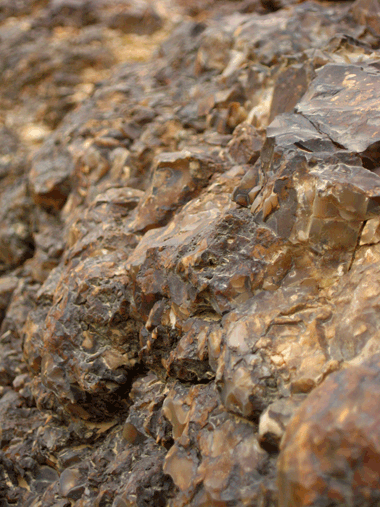
Kerogen-infused oil shale in the Niqab, Israel.
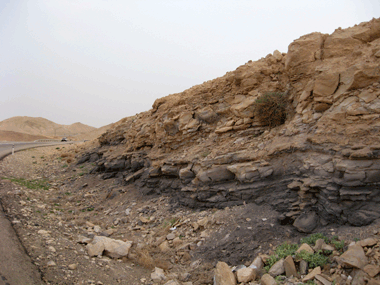
Bituminous formation of oil shale near Dimona in the Niqab. Photo: M. Stainsby
Climate activists are targetting Canada's tar sands for good reason. What's happening in Alberta is the opposite of a serious attempt to deal with climate change. What then do we say of the development of oil shale for both energy and emission intensive synthetic oil? Is it really possible that the worst of both oil and coal developments are being planned in yet another new, destructive industry?
For now, oil shale (not fracking) only exists commercially in Brazil, China and Estonia. The technology involved in mining and extracting oil from oil shale is very similar to that of Canadian tar sands mining. In situ oil shale and tar sands extraction are even closer in terms of the techologies employed.
More than half of the potential “oil” left on the earth, if all were recoverable, is made up of oil shale that can yield kerogen when heated, either in the ground or after mining and a pulverization. The “retorting” process (heating the shale until kerogen "bleeds" out at extreme temperatures) borrows from a Canadian bitumen extraction, called the “Alberta Taciuk” process.
Estonia, Brazil and China have also developed their own unique, specific processes as well (Enefit, Petrosix and the Fushun process, respectively). Each one of the known processes for extraction of Kerogen from shale consumes more energy than tar sands bitumen extraction. But based on the technological and economical “successes” in the Canadian tar sands, oil shale development is expanding and corporations with experience are leading the way...
The way, that is, to a deepening of dependence on fossil fuels and locked in process of climate change that would leave the planet inhospitable for most life.

